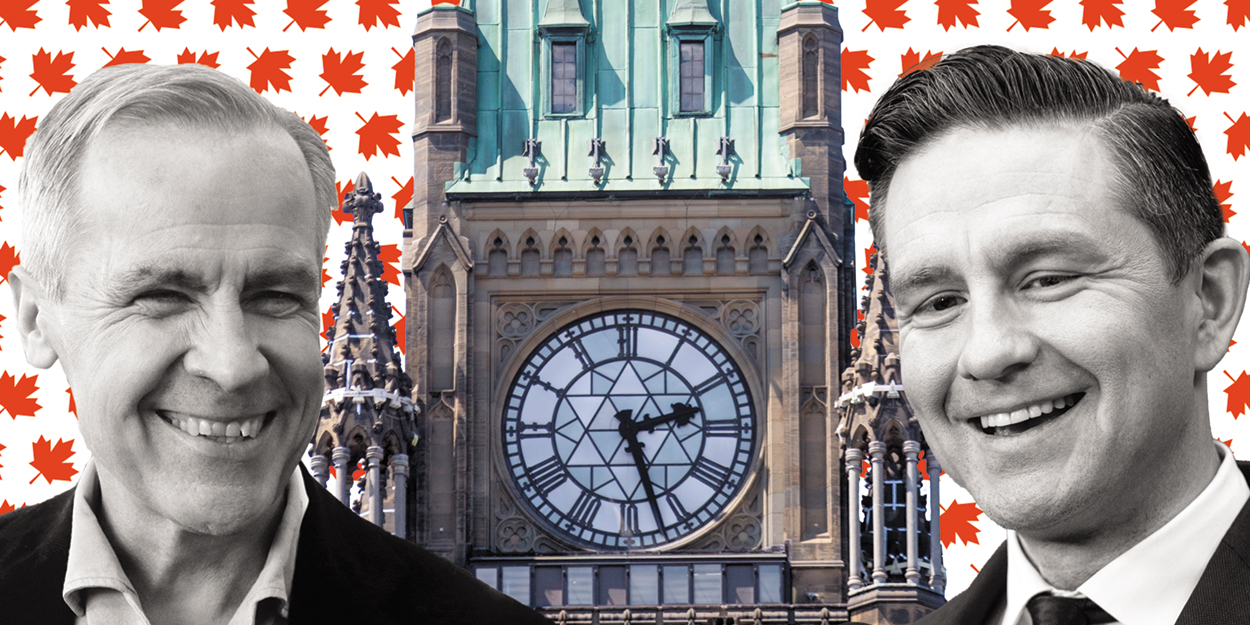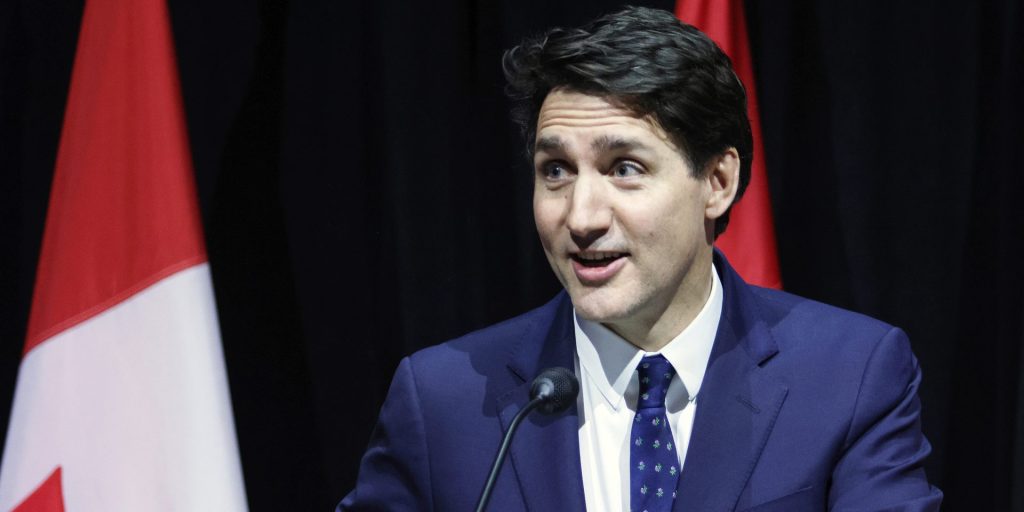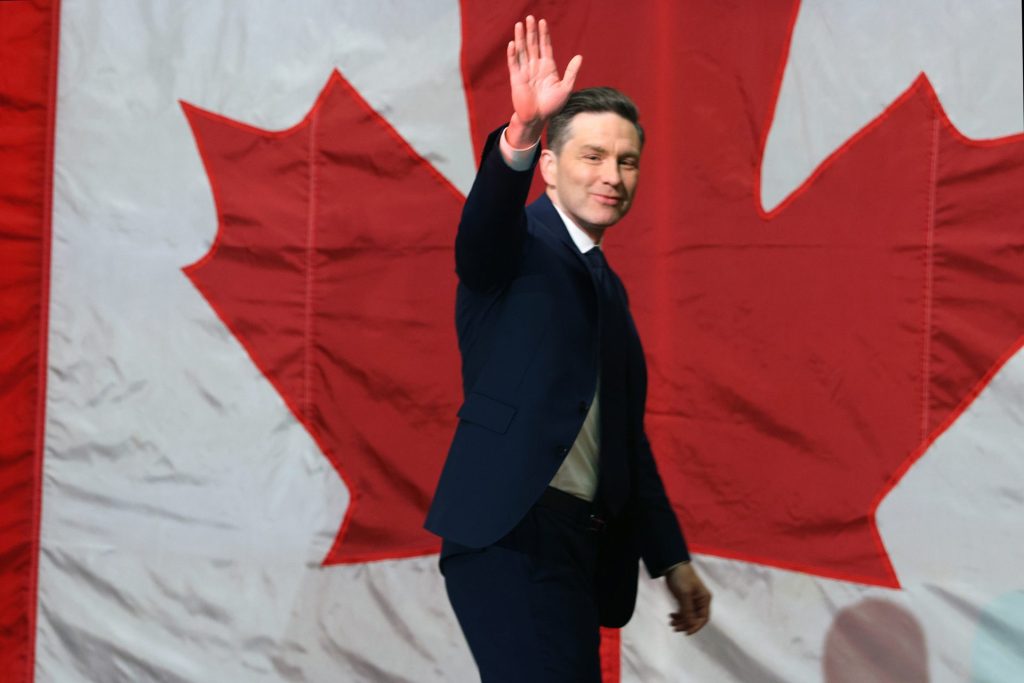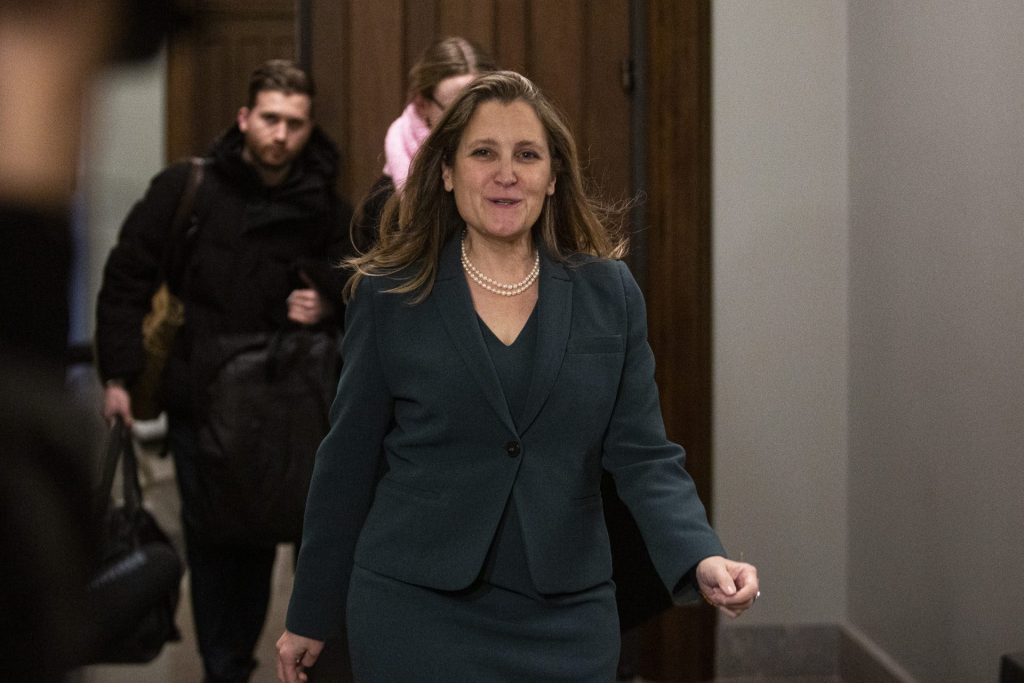Rising patriotism, anger at Trump propel Carney campaign to competitive position, polls suggest

Fears over U.S. President Donald Trump’s economic and sovereignty threats against Canada have shifted public opinion about both main federal political parties and the most pressing issues facing the country, according to a series of polls, with Liberal leadership candidate Mark Carney appearing to be the main beneficiary.
“We’re seeing significant jumps in the percentage of Canadians who are saying they’re very proud to be a Canadian, and they think Canada is the best country in the world,” said Andrew Enns, executive vice-president of Leger’s Central Canada operations. “I think that is actually creating a different feeling for Canadians when they’re looking at their leaders and what they’re expecting.”
Two polls released by Leger and Nanos Research last week showed the Conservatives’ long-time lead had been cut to single digits, though the party would still win majority government if an election were held at the time of the surveys.
A Leger poll conducted between Feb. 7-10 showed the Conservative Party led in voting intentions with 40 per cent support, compared with 31 per cent for the Liberal Party. However, the two parties were tied at 37 per cent when respondents were asked about their choice in an election in which Carney led the Liberals.
Carney also proved the most popular choice to replace Prime Minister Justin Trudeau (Papineau, Que.) as Liberal leader, with a plurality—37 per cent—of support among all respondents, and a majority—68 per cent—of Liberal voters. Former finance minister Chrystia Freeland (University–Rosedale, Ont.) was the choice of 12 per cent of all respondents and 14 per cent of Liberal voters, while former government House leader Karina Gould (Burlington, Ont.) was backed by three per cent of both voters.
Another 30 per cent of total respondents did not know who should succeed Trudeau, while 17 per cent opted for someone else.
“Mr. Carney has captured the attention of voters,” Enns said. “I would argue the lens that voters are looking at their leaders currently has shifted a bit compared to what it was prior to Christmas.”
Nanos’ weekly tracking, released on Feb. 11, showed the Conservatives had 38.3 per cent support, compared to 30.1 per cent for the Liberals, 16.4 per cent for the NDP, 7.8 per cent for the Bloc Québécois, 4.8 per cent for the Green Party, and two per cent for the People’s Party.
Nanos’ data is based on a four-week rolling average, with 1,005 random interviews included in the total. Each week, the oldest group of 250 interviews is dropped, while a new group of the same number is added.
Concern about the Canada-U.S. relationship has also increased 10-fold as the most important national issue of concern since Jan. 10, according to the Nanos poll. Some 10.3 per cent of respondents considered the Trump/U.S. relationship to be the most important issue in the most recent poll, up from 1.4 per cent on Jan. 10. Jobs and the economy remained the top issue for respondents, albeit with a lower percentage, at 19.3 per cent compared to 20.4 per cent on Jan. 10.
Trump threatened to levy 25-per-cent tariffs on all Canadian and Mexican imports—with the exception of energy products, which would instead be slapped with a 10 per cent tariff—starting on Feb. 4. But he backed down the day before the tariffs were due to take effect, following calls with Trudeau and Mexican President Claudia Sheinbaum, and Canadian threats of retaliatory tariffs on U.S. imports. At the time, Trump said both countries would be subject to a 30-day reprieve from the new tariffs.
But last week, Trump slapped a 25-per-cent tariff on all steel and aluminum imports to the U.S., without exemptions, from all countries starting March 12. The Canadian Press reported on Feb. 11 that a White House official said on background that these tariffs would be stacked atop the 25-per-cent levies threatened on all other Canadian goods.
National pride has also risen, according to a second Leger poll on Feb. 12–85 per cent indicated they were either very or somewhat proud to be a Canadian. That included 85 per cent of Liberal voters, 88 per cent of NDP and Green voters, 81 per cent of Conservative voters, 78 per cent of Bloc voters, and 69 per cent of People’s Party voters.
That is a nine-point jump from a June 30, 2024, poll from Leger, when 76 per cent said they were proud to be a Canadian.
The Feb. 12 Leger poll showed 82 per cent of respondents were either very or somewhat concerned that Trump will use various means, “such as tariffs and trade sanctions, to try and force Canada into a much closer and more formal union with the United States.” Liberal and NDP voters were most concerned, at 92 per cent and 93 per cent respectively, compared to three-quarters of Conservative voters.
That “more formal union” includes Trump’s repeated ambitions to make Canada his country's “51st state," which he has repeatedly justified with the lie that America “subsidizes” Canada with $200-billion a year. The U.S. has a trade deficit with Canada as it buys more products from this country than vice versa, which is not a subsidy.

While government figures initially dismissed Trump’s remarks about annexation as a joke, the Toronto Star reported on Feb. 7 that a hot mic caught Trudeau telling Toronto business leaders that it was “a real thing.” Trump repeated that during an interview with Fox News on Feb. 9, while White House deputy chief of staff James Blair tweeted that the U.S. “never agreed that Canada would not be the 51st state” following a Feb. 12 meeting with Canada’s premiers.
Most Canadians don’t believe Trump is joking, either, according to a Pollara survey published on Feb. 11. Only 10 per cent believed the American president was joking, while 34 per cent felt he was serious, and 47 thought he was using the comments as a negotiating tactic.
Some 68 per cent of respondents felt angry or frustrated about Trump, compared to only 22 per cent who were comfortable or excited about him. Conservative voters were the most divided—47 per cent were angry or frustrated, and 44 per cent were comfortable or excited—while Liberal and NDP voters

The Trump effect has presented challenges for the Conservative Party and its leader, Pierre Poilievre (Carleton, Ont.), according to Frank Graves, president of Ekos Research. So, too, if the declarations by Liberal leadership contenders Carney and Freeland not to continue with consumer carbon pricing.
“It was going to be the carbon tax election, even two weeks ago. They were steadfast on that, and all of sudden, well, it won't be,” Graves said. “The salient issue for voters is not the carbon tax—if it ever was—it's now what are we going to do about Trump and all this crazy stuff going on down south.”
“So [Poilievre’s] got to pivot, but then he's caught because his constituency has really got two components, 25 per cent of voters are overwhelmingly male, institutionally mistrustful, exhibit high levels of disinformation, were very sympathetic to the Freedom Convoy, for example," said Graves. "That group is very different than the other 20 per cent of voters which had joined the Conservatives. They were not mistrustful, they weren't climate change deniers, they didn't like the convoy, and we're kind of alarmed by Trump, so that's where a lot of the problems have come.”

Ekos first recorded an improvement in the Liberals’ fortunes on Jan. 17, rising to 28 per cent support after a drop to 19.4 per cent on Dec. 20, 2024, in the wake of Freeland’s resignation as finance minister.
The most recent public release of Ekos data, on Jan. 29, showed the Liberals’ with 32.7 per cent support, compared to 35.7 per cent for the Conservatives, 13.1 per cent for the NDP, 7.1 per cent for the Bloc—or 32 per cent in Quebec alone—4.9 per cent for the Green Party, and 4.7 per cent for the People’s Party.
That poll showed the Liberals had a 23-point lead in Atlantic Canada, and were tied with the Conservatives in Ontario and Quebec—though the Bloc held a seven-point lead over the two parties in the latter. The Conservatives held a 32-point lead in Alberta, and a one-point lead in British Columbia.
Graves said his firm could detect the shift earlier due to higher daily sample sizes of approximately 250 people a day.
“It's extraordinarily rare to see this level of movement,” Graves said. “And it's not noise–it's real movement, and driven by some pretty powerful forces. So basically, we're in a completely different situation than we were a month ago.”
But the news is not completely bad for the Conservatives or Poilievre. Polls still show the party has a plurality of votes, while the Feb. 12 Leger survey found another plurality—22 per cent of respondents—most trusted Poilievre to handle the Canada-U.S. relationship during Trump’s administration, followed by Carney at 20 per cent. The response “none of them” was the next most popular option, at 11 per cent, above both Trudeau and Ontario Premier Doug Ford at nine per cent each.
Poilievre was chosen as the top leader in managing the relationship by 58 per cent of Conservative voters and 18 per cent of People’s Party voters, but placed lower than Carney among the voters of all other parties.
The Liberal leadership candidate was the most trusted figure on the relationship to a plurality of Liberal, Bloc, and Green voters, and placed second behind NDP Leader Jagmeet Singh (Burnaby South, B.C.) among that party’s voters, 20 per cent to 34 per cent.
sjeffery@hilltimes.com
The Hill Times





 LICENSING
LICENSING PODCAST
PODCAST ALERTS
ALERTS













